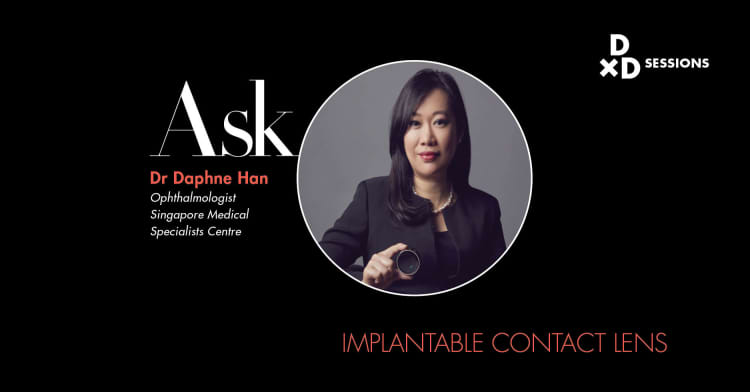Human Session held on 31 August 2018.
Dr Daphne Han is a Senior Consultant, Ophthalmologist with more than 18 years of experience. She manages all types of eye-related conditions in the young and old, with a special focus on cataract surgeries, LASIK, and its alternatives. She also manages myopia control and glaucoma, age-related macular degeneration and diabetic retinopathy. She has a special interest in artificial iris implant. She is also a key opinion leader and consultant for several lens and laser companies.
Implantable Contact Lens is another vision correction procedure available in Singapore. ICL surgery is simple, and takes about 10 minutes to complete. A soft, flexible gel-lens is inserted between the iris and the eye lens through a small incision.
Dr Daphne answered questions from readers on:
- Suitable candidates for Implantable Contact Lens (ICL)
- Advantages of ICL
- How is ICL done
- Possible complications of getting ICL
- Cost of an ICL procedure
How much does ICL surgery cost in Singapore, and what affects the costs?
Hi Parlene,
Typically, most clinics charge upwards of $10,000 for ICL surgery for two eyes.
In general, the cost for ICL surgery depends on three main factors:
- The doctor performing the surgery
- Where the surgery is being performed
- The eye power being treated
Facility fees may or may not be included in the surgical fees. Facility fees for surgery performed at a more established surgical setting (such as reputable, centrally located hospital operating theatre versus a standalone day surgery centre) is generally higher.
ICL that treats both myopia and astigmatism is more costly than ICL that treats myopia alone.
Does LASIK or ICL provide the best possible vision correction, assuming both are medically feasible?
Dear Tracy,
I'd like to breakdown both procedures for you to better compare them.
ICL involves implantation of a soft, foldable lens into the internal part of the eye called the “sulcus”, which is a rather narrow space between the natural lens of the eye and the back of the iris (the coloured diaphragm of the eye).
After the successful insertion of the ICL, the quality of vision is usually excellent, with minimal side effects like glare and halos at night. Glare and halos at night tend to accompany LASIK, particularly for higher power of treatment.
As the ICL surgery does not affect the cornea (other than the small incision at the side of the cornea), it tends not to cause as much dry eyes as LASIK, no matter how high the eye power treated.
In comparison to LASIK, ICL is particularly great for treating high amount of myopia and astigmatism.
In my years of doing ICL, I have successfully corrected close to 2000 degrees of myopia and up to 500-600 degrees of astigmatism for my patients using ICLs with good results.
Who is a suitable candidate for ICL in Singapore, and what are the most common reasons for ICL surgery in Singapore?
Hi Erlina,
In Singapore, the most common reasons for ICL surgery are:
- High myopia
- High astigmatism
- Thin or irregular cornea not meeting criteria for LASIK
- Patients with complications from previous LASIK needing correction
- Patients with regression of power after previous LASIK who cannot have further enhancements
- Those who simply prefer the ICL over LASIK, having been fully informed of the pros and cons of all options
- Patients who had previous cataract surgery and wish to correct significant residual eye power
The newest model of the ICL (the EVO Visian ICL by Staar Surgical which has additional safety feature called the KS aquaport) is recently CE-approved for patients from 21 up to 60 years old.

EVO Visian ICL
Can I play contact sports and swim after having ICL implants?
Dear Kai Fai,
ICL is safe for these sports after the usual recovery period of 4-6 weeks. During the post-operative recovery period, it is important to keep the eyes very clean and avoid contaminating the eyes in places like swimming pool or hot baths.
In general, the risk of trauma in post-ICL eyes such as ball injury or contact sports (e.g. boxing or rugby) is low, but there is a chance that such injuries may predispose to a shift in position of the ICL or even rupture of the small cornea incision.
From my years of performing ICL surgeries, I have certainly never come across such cases in real life. However, these cases have been reported in the scientific literature, albeit very rarely. For those engaging in contact sports, protective gear is highly recommended to guard against eye injury.
Hope this helps!
What are the main disadvantages and risks of Implantable Collamer Lens (ICL) surgery?
Hi Joel,
As a procedure that involves placing the ICL into the limited internal space of the eye, the main risks are to the surrounding structures during the surgery as well as post-surgery.
Firstly, the clear, natural lens of the eye may develop a cataract due to the ICL surgery, although this risk seems to be lowered with the new ICL design (EVO Visian ICL with KS port).
Secondly, there is also a risk of the eye developing glaucoma, either temporarily after the surgery, or gradually in the long term.
How do eye surgeons determine which lens to use for ICL surgery?
Dear Bei Ru,
Currently I would only recommend one brand of ICL for those considering a phakic lens implant surgery ( that means with a healthy and intact natural lens in the eye), that is the Staar Surgical’s EVO Visian ICL, due to its positive safety track record.

EVO Visian ICL
Those with significant astigmatism (around 75-100 degrees and above) are strongly encouraged to incorporate astigmatic correction in the ICL for improved vision outcome.
Can the ICL lens be removed or replaced for any reasons?
Dear Si Jing,
You do not have to be paranoid because ICL is a reversible procedure and can be quite safely removed through the original port of entrance.
Hope this helps!
How can I find the best doctor for ICL surgery in Singapore?
Hi Jeremiah,
My advice is to choose a doctor who is not just skilled in the procedure but someone who is also able to offer an opinion from all points of view. Not all eyes are suitable for ICL, neither are all eyes suitable for LASIK, SMILE, or transPRK.
Ideally, your doctor should be equally skilled in all these procedures, or at the minimum, be knowledgeable about all the pros and cons of these procedures, so as to reduce any biasness towards any one procedure.
Choose the most suitable and best procedure for your eyes and yourself based on facts. Try not to fit your eyes to a pre-determined choice simply based on hype and hearsay.
Good luck!
How much Medisave or subsidies can I claim for ICL surgery in Singapore?
Hi Jing Long,
From my experience, cases of successful Medisave claims for ICL are usually quite few.
Unless your eyes have a difference of more than 300 degrees, or you have previously undergone other eye operations, ICL is generally considered a refractive surgery which you have to pay for on your own.
However, on a case by case basis, doctors may assist you in applying for these claims, but the outcome depends on the merits of the case scenarios.
How can I best prepare for the ICL surgery to get optimal outcomes?
Hi Min Xiu,
Before any eye surgery, ICL included, it helps to avoid dry eyes because this causes unstable vision and eye power, making any eye and power measurements inaccurate.
Similarly, after the surgery, avoid exposing your eyes to dry and dusty environment to ensure a trouble-free recovery period.
Hope this helps!
How long does it take for my eyes to heal completely after ICL surgery, and what precautions should I take?
Dear Anthony,
Generally, it takes about one month for eyes to heal after ICL surgery, with minor fluctuations up to the first 3 months.
Follow instructions and use the prescribed post-operative eye drops faithfully. Keep your eyes (as well as your hands) clean, and make sure you do not contaminate your healing eyes in the first few weeks, which also mean no wetting the eyes, no eye make-up, massages etc.
I always remind my post-op patients not to swim or participate in water sports for a month to avoid possible contamination. Remember to rest your eyes frequently to avoid them drying out, so that you recover well and get to enjoy your new vision thereafter!
Ever wanted to ask a health question to a specific renowned specialist in Singapore? Human Sessions are when these expert doctors answer all your questions!
View the complete list of upcoming Human Sessions here.









